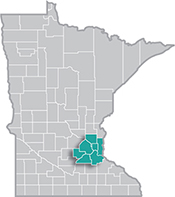 The Minneapolis-St. Paul metropolitan area is a national leader in finance, advanced manufacturing, agriculture and retailing.
The Minneapolis-St. Paul metropolitan area is a national leader in finance, advanced manufacturing, agriculture and retailing.
Medical devices, electronics and processed foods are strong suits recognized globally.
Want the freshest data delivered by email? Subscribe to our regional newsletters.
3/31/2021 9:00:00 AM
Tim O'Neill
Enjoy working with computers and computer databases, software, cybersecurity, or coding? If so, working in the Information Technology field may be your calling. And, for those interested in this field, Information Technology is in high demand in the Twin Cities Metro Area.
According to DEED's Occupations in Demand (OID) tool, there are 11 distinct computer occupations with high demand in the Metro Area. It's these types of occupations that are most associated with Information Technology, which spans nearly every industry sector in the labor market. Zooming out, these types of occupations typically require higher levels of post-secondary education, ranging from associate degrees to bachelor's and advanced degrees. With higher education requirements comes higher typical wages.
Software Developers and Software Quality Assurance Analysts and Testers, which is the occupation with the largest employment of these Information Technology occupations, has a median hourly wage of $50.71 in the Metro Area. Working full-time and year-round, such a worker would earn over twice as much as the typical worker across all industries in the Metro Area.
At the national level, Computer and Information Technology Occupations are projected to grow by 11.0% between 2019 and 2029, much faster than the average for all occupations. As explained by the Bureau of Labor Statistics (BLS), this increase is largely due to increased emphasis on cloud computing, the collection and storage of big data, and information security.
This robust growth is expected closer to home as well. According to DEED's 2018 to 2028 employment projections, Computer and Mathematical Occupations are projected to grow by 11.3% in the Metro Area. Total employment across all occupations is projected to grow by 5.3% - meaning Information Technology jobs are projected to grow more than twice as fast. The fastest growth will be among Information Security Analysts and Computer and Information Research Scientists, while the largest projected growth will be among Software Developers and Computer Systems Analysts.
| Soc Code | Job Title | 25th Percentile Wage | Median Wage | 2018 – 2028 Employment Projections | Education Requirements | |
|---|---|---|---|---|---|---|
| Growth | Openings* | |||||
| 151256 | Software Developers and Software Quality Assurance Analysts and Testers | $82,796 | $105,470 | +17.7% | +7,700 | Bachelor's |
| 151212 | Information Security Analysts | $82,078 | $103,978 | +29.2% | +1,168 | Bachelor's |
| 151231 | Computer Network Support Specialists | $54,702 | $65,304 | +5.8% | +781 | Associate |
| 151241 | Computer Network Architects | $94,863 | $116,165 | +4.2% | +511 | Bachelor's |
| 151211 | Computer Systems Analysts | $75,391 | $95,240 | +8.5% | +4,910 | Bachelor's |
| 151232 | Computer User Support Specialists | $46,571 | $57,312 | +8.6% | +2,802 | Vocational training |
| 151257 | Web Developers and Digital Interface Designers | $61,085 | $82,193 | +5.8% | +666 | Associate |
| 151221 | Computer and Information Research Scientists | $106,361 | $129,273 | +25.1% | +102 | Graduate or Professional |
| 151245 | Database Administrators and Architects | $75,785 | $101,050 | +8.3% | +552 | Bachelor's |
| 151251 | Computer Programmers | $66,240 | $88,605 | -8.9% | +600 | Bachelor's |
| 151244 | Network and Computer Systems Administrators | $72,497 | $88,909 | +4.6% | +1,355 | Bachelor's |
| Source: DEED Occupations in Demand
*Includes net new openings and labor market exit openings |
||||||
It should be noted that the Twin Cities Metro Area accounts for the largest share of Minnesota's Information Technology jobs. More specifically, where the region accounts for about 62.7% of the state's total employment, it accounts for 85.3% of the state's Information Technology jobs.
It should also be noted that industries where Information Technology jobs are highly concentrated have been more resilient to the impacts of COVID-19 on the economy. For example, the Twin Cities Metro Area's total employment declined by 9.3% between the third quarters of 2019 and 2020. Professional, Scientific, and Technical Services, the industry with the highest concentration of Information Technology jobs, declined by just 5.6% during that time.
To discover more about Information Technology occupations in the Metro Area, visit DEED's Career and Education Explorer Tool.
April 2021 is Tech Month in Minnesota. Learn more at CareerForceMN.com/TechMonth.
Contact Tim O'Neill, Labor Market Analyst.